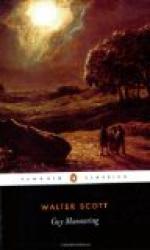Part of Brown’s view in choosing that unusual track which leads through the eastern wilds of Cumberland into Scotland, had been a desire to view the remains of the celebrated Roman Wall, which are more visible in that direction than in any other part of its extent. His education had been imperfect and desultory; but neither the busy scenes in which he had been engaged, nor the pleasures of youth, nor the precarious state of his own circumstances, had diverted him from the task of mental improvement. ‘And this then is the Roman Wall,’ he said, scrambling up to a height which commanded the course of that celebrated work of antiquity. ’What a people! whose labours, even at this extremity of their empire, comprehended such space, and were executed upon a scale of such grandeur! In future ages, when the science of war shall have changed, how few traces will exist of the labours of Vauban and Coehorn, while this wonderful people’s remains will even then continue to interest and astonish posterity! Their fortifications, their aqueducts, their theatres, their fountains, all their public works, bear the grave, solid, and majestic character of their language; while our modern labours, like our modern tongues, seem but constructed out of their fragments.’ Having thus moralised, he remembered that he was hungry, and pursued his walk to a small public-house, at which he proposed to get some refreshment.
The alehouse, for it was no better, was situated in the bottom of a little dell, through which trilled a small rivulet. It was shaded by a large ash tree, against which the clay-built shed that served the purpose of a stable was erected, and upon which it seemed partly to recline. In this shed stood a saddled horse, employed in eating his corn. The cottages in this part of Cumberland partake of the rudeness which characterises those of Scotland. The outside of the house promised little for the interior, notwithstanding the vaunt of a sign, where a tankard of ale voluntarily decanted itself into a tumbler, and a hieroglyphical scrawl below attempted to express a promise of ‘good entertainment for man and horse.’ Brown was no fastidious traveller: he stopped and entered the cabaret. [Footnote: See Note 2.]
The first object which caught his eye in the kitchen was a tall, stout, country-looking man in a large jockey great-coat, the owner of the horse which stood in the shed, who was busy discussing huge slices of cold boiled beef, and casting from time to time an eye through the window to see how his steed sped with his provender. A large tankard of ale flanked his plate of victuals, to which he applied himself by intervals. The good woman of the house was employed in baking. The fire, as is usual in that country, was on a stone hearth, in the midst of an immensely large chimney, which had two seats extended beneath the vent. On one of these sat a remarkably tall woman, in a red cloak and slouched bonnet, having the appearance of a tinker or beggar. She was busily engaged with a short black tobacco-pipe.




